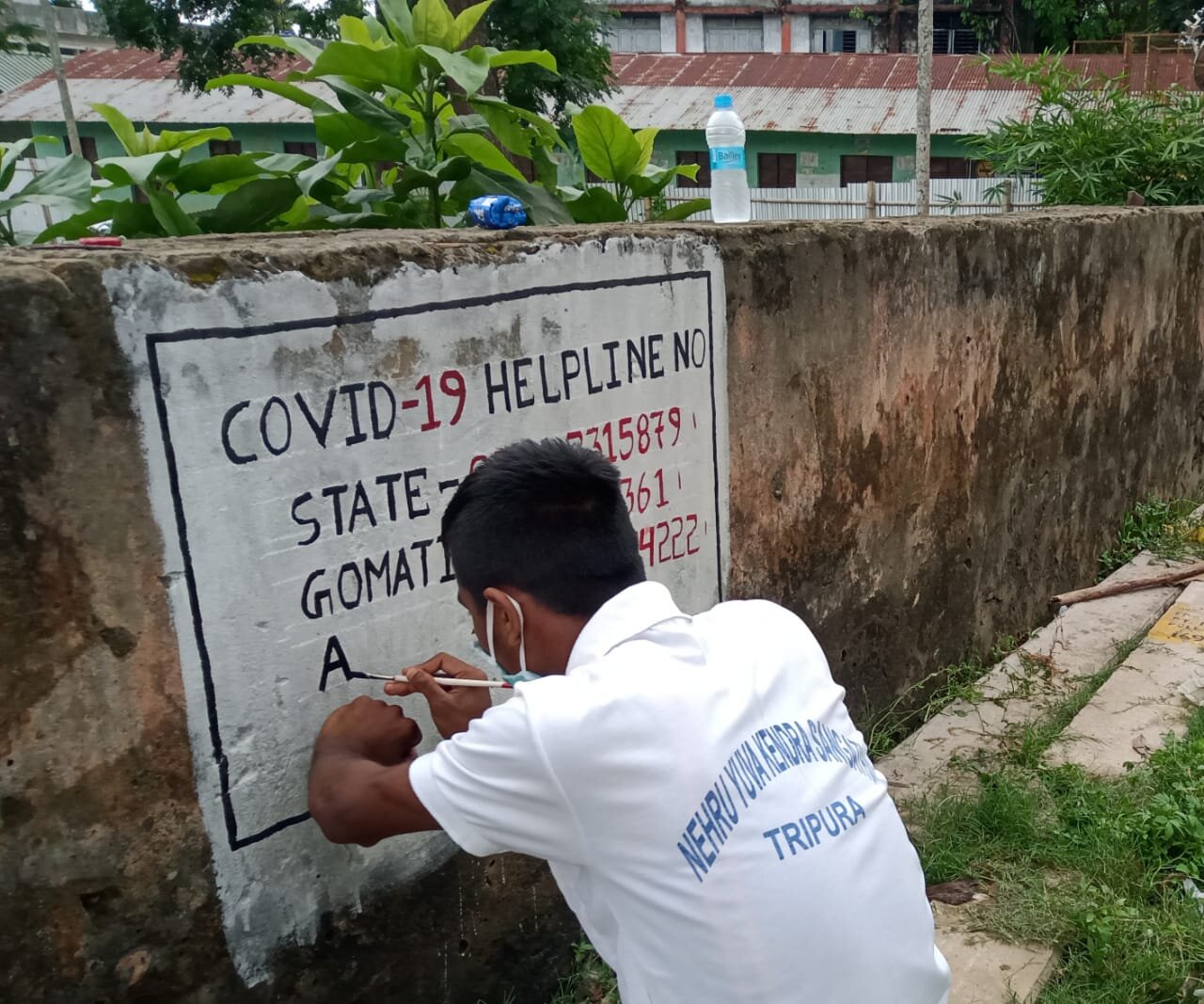Health Response
© WHO
World Health Organization (WHO) field personnel conduct COVID-19 serology testing in Bihar. When COVID-19 struck India, WHO was able to mobilize its network of over 2600 experts and field personnel that had worked along with the government and other partner organizations to help India become polio-free to the COVID-19 response — scaling up surveillance, contact tracing, capacity-building, laboratory diagnosis, hospital preparedness, infection prevention and control, and risk communications and community engagement.
© UNICEF/UNI341087/Panjwani
Dr. Neeraj , a UN Children’s Fund (UNICEF) Consultant, demonstrates hand sanitizing techniques and the benefits of social distancing at Mamta Diwas (VHND) at Chanota Fadia, AW Baria, Gujarat. UNICEF provided technical assistance and supported district management planning, monitoring containment measures, and surveillance activities in the state.
© UNDP/Pelevizo Meyase
A healthcare worker displays face masks delivered by the UN Development Programme (UNDP) in Nagaland. Healthcare workers are on the frontlines risking their lives to keep everyone safe, and the UN team is supporting the Government of India in ensuring they remain protected. UNDP has distributed nearly 1 million pieces of safety equipment to 8 state health departments, and reached 200,000 sanitation workers with nearly half a million safety kits and 60 million kilos of rations.
© WHO
Field monitors in Uttar Pradesh trace contacts of a confirmed COVID-19 case. Field monitors in the state conducted telephone interviews of laboratory-confirmed positive cases through a set of questions developed by WHO. Contact tracing is an essential public health tool for controlling the pandemic, and WHO provided technical support to the state government to boost its contact tracing efforts. In August the WHO team assessed the status and quality of contact tracing amongst the 58 000 laboratory-confirmed cases of COVID-19 in 75 districts across UP.
© UNFPA
Gynaecologist Dr. Rajendra and nurse-midwife Ms. Rukmani Kaur in Jaisalmer, Rajasthan, are among the frontline workers ensuring that critical sexual and reproductive health services are provided to those in need through the pandemic. The UN India team, including the UN Population Fund (UNFPA), WHO, and UNICEF, has worked to ensure continuity of Reproductive, Maternal, Newborn Child plus Adolescent Health (RMNCH+A) services, providing essential supplies, training nurses and medical staff in COVID-prevention and offering technical assistance.
© UNDP/UNV
A Volunteer paints a mural for a community awareness generation campaign. Volunteers have stepped up and provided selfless service at the frontlines of the COVID-19 response. The UN Volunteer programme has engaged thousands of youths to become community volunteers in their communities to spread correct information and positivity, both offline and online.
© UNFPA
In September, UNFPA, together with the Rajasthan Ministry of Health, launched a communication campaign under the 'Naubat Baja' infotainment initiative, focusing on COVID-19 and Reproductive, Maternal, Newborn, Child, and Adolescent Health. The campaign reached an estimated 500,000 people in the most affected districts of Rajasthan. The UN India team works with national and local governments to spread awareness, eliminate stigma and combat misinformation around the virus.
© WHO
Preventive chemotherapy through mass drug administration (MDA) is a strategy to treat entire at-risk populations for lymphatic filariasis. A health care worker places medicines into a ‘katori’ (bowl) in Jharkand during MDA. When COVID-19 struck, the door-to-door distribution of the drugs for interrupting transmission of lymphatic filariasis (LF) became a challenge – the government officials and partners came up with this innovative and simple solution for contact-less administering of medicines. WHO supported the state government in the campaign, providing technical support, monitoring and training.
© UNESCO New Delhi/Gurgaon Ki Awaaz
A community radio programmer participates in a UN Educational, Scientific and Cultural Organization (UNESCO) -supported training session. With the aim of fighting misinformation and disinformation about COVID-19, UNESCO and Maraa’s Project launched a national network of community radio stations, allowing them to learn, collaborate and counter the ‘infodemic’ together. Community radios are “hyper-local” mediums which can broadcast credible content in the regional dialect and inspire trust in communities.
© UNICEF/UNI341141/Panjwani
Families receive vaccinations and counselling at a socially distanced Village Health and Nutrition Day in Gujarat. Nearly 5 million children and women are receiving essential healthcare, including prenatal, delivery and postnatal care, essential newborn care, immunization and HIV care in UNICEF-supported facilities.
© Human Touch Foundation
Celina D’Costa sorts out antiretroviral drugs at the Antiretroviral Therapy Centre of Goa Medical College. For the more than 3000 people living with HIV and on antiretroviral therapy in Goa, the COVID-19 outbreak and ensuing lockdown were a time of great worry — both over the new virus and being able to get their HIV treatment. Human Touch Foundation, a community-based organization supported by UNAIDS, sprung into action, organizing volunteers to deliver the life-saving drugs to doorsteps across the island. UNAIDS continues to work with the government and community-based organisations to ensure that medicines are delivered to those in need.










